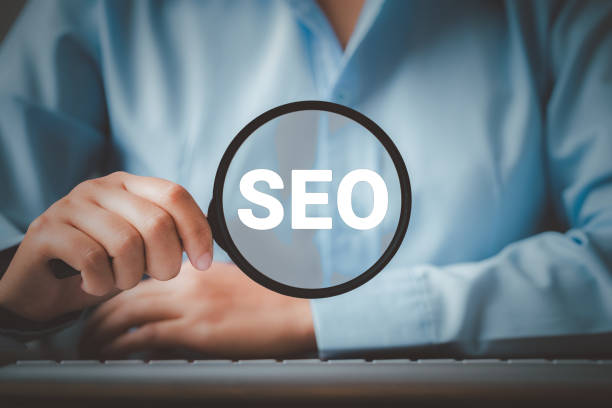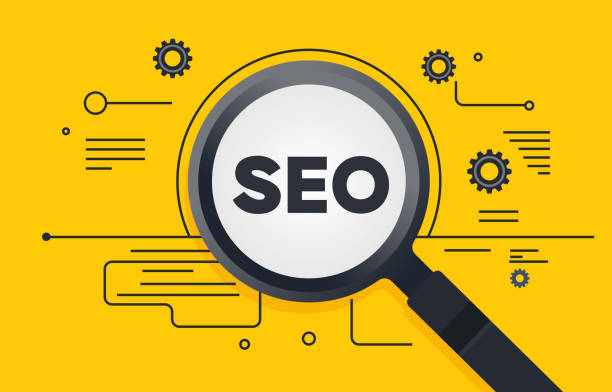What is SEO and why is it important?

What is SEO and why is it important?
#SEO, short for “Search Engine Optimization,”
refers to the set of activities performed to improve a website’s ranking in search engine results, such as Google, Bing, and Yahoo.
The main goal of SEO is to increase website visits through organic (free) traffic.
In essence, SEO is an effort to ensure your website ranks higher on the Search Engine Results Page (SERP) for keywords related to your business.
The importance of SEO can be examined from several perspectives:
- Increasing targeted traffic: SEO helps people who are looking for your products or services easily find your website.
This targeted traffic increases the likelihood of converting visitors into customers. - Reducing marketing costs: Compared to paid advertising, SEO is a long-term and cost-effective marketing strategy.
By optimizing your website, you can continuously attract organic traffic and reduce advertising costs. - Increasing brand credibility: Ranking high in search results shows audiences that your website is credible and trustworthy.
This helps to increase brand awareness and strengthen your position in the market. - Improving user experience: Many SEO techniques, such as improving website speed and responsive design, also help improve user experience.
A website with a better user experience attracts more visitors and increases the conversion rate.
In today’s digital world, SEO is a necessity for any business that wants to succeed online.
By investing in SEO, you can increase your website’s visibility, attract targeted traffic, and ultimately increase your sales and profits.
Are you tired of your online store not generating as much revenue as its potential allows? Rasaweb, specializing in professional online store design, solves this problem once and for all!
✅ Increased sales rate and revenue
✅ High loading speed and exceptional user experience
⚡ Get free consultation for online store design
Key Concepts in SEO

Key Concepts in SEO
To better understand SEO and implement it effectively, you need to be familiar with its key concepts:
- Keywords: These are the words that users enter into search engines to look for specific information, products, or services.
Keyword research and selection of appropriate words is one of the most important steps in SEO.
You should choose words that are both relevant to your business and searched for by your target audience. - On-Page SEO: Refers to optimizing elements within your website, such as content, titles, meta descriptions, images, and website structure.
The goal of on-page SEO is to improve the relevance of the website to keywords and provide an excellent user experience. - Off-Page SEO: Refers to activities that take place outside of your website to improve your website’s ranking in search results.
The most important part of off-page SEO is link building, which is acquiring links from other websites to your own website. - Content: High-quality and relevant content is one of the most important ranking factors in search engines.
The content should be engaging and useful for the audience and answer their questions and needs. - User Experience (UX): User experience refers to the feeling that users have when visiting your website.
A website with a good user experience should be fast, easy to use, and engaging. - Bounce Rate: Bounce rate refers to the percentage of visitors who leave your website after visiting only one page.
A high bounce rate indicates that your website’s content is not engaging for visitors. - Conversion Rate: Conversion rate refers to the percentage of visitors who take a desired action, such as buying a product, signing up for a newsletter, or contacting you.
The ultimate goal of SEO is to increase the conversion rate.
Familiarizing yourself with these key concepts will help you better understand SEO and implement more effective strategies to improve your website’s ranking.
Keyword Research: Finding the Best Opportunities

Keyword Research: Finding the Best Opportunities
Keyword research is the cornerstone of any successful SEO strategy.
The goal of this research is to find the words that your target audience uses to search for your products or services.
These words should be relevant to your business, have a reasonable search volume, and have relatively low competition.
To conduct keyword research, you can use various tools, such as:
- Google Keyword Planner: A free tool from Google that helps you find related keywords, check their search volume, and assess the level of competition.
- Ahrefs: A paid tool that offers more advanced features for keyword research and competitor analysis.
- SEMrush: Another paid tool that, similar to Ahrefs, offers extensive features for SEO and digital marketing.
In addition to these tools, you can also use the following techniques to find keywords:
- Brainstorming: Create a list of words and phrases that are related to your business.
- Competitor Analysis: Check what keywords your competitors are using.
- Q&A: Pay attention to your customers’ questions and comments and identify the words they use.
After finding a list of potential keywords, you need to evaluate them and choose the best ones.
To do this, pay attention to the following points:
- Relevance: Keywords should be directly related to your products or services.
- Search Volume: Keywords should have a reasonable search volume, meaning that a sufficient number of people search for them per month.
- Competition: Keywords should have relatively low competition, meaning that few websites are ranking for them.
Using these methods and tools, you can find the best keywords for your business and design your SEO strategy based on them.
| Keyword | Monthly Search Volume | Competition Level |
|---|---|---|
| Buy phone | 10000 | Medium |
| Best restaurant in Tehran | 5000 | High |
| SEO Training | 2000 | Low |
On-Page SEO: Optimizing Content and Site Structure

On-Page SEO: Optimizing Content and Site Structure
SEO On-page refers to optimizing elements within your website.
These elements include content, titles, meta descriptions, images, website structure, and more.
The goal of on-page SEO is to improve the relevance of the website to keywords and provide an excellent user experience.
The most important on-page SEO elements include:
- Title Tags: Titles are the most important on-page SEO element.
They tell search engines and users what your page is about.
Titles should contain the page’s main keywords and be engaging and catchy. - Meta Descriptions: Meta descriptions are a summary of your page’s content that appears below the page title in search results.
Meta descriptions should be attractive and compelling and encourage users to click on your link. - Content: High-quality and relevant content is one of the most important ranking factors in search engines.
Content should be engaging and useful for the audience and answer their questions and needs.
Content should contain the main and secondary keywords of the page, but avoid overusing keywords. - Heading Tags: Heading tags (H1, H2, H3, etc.) help organize the content of the page and tell search engines what the different sections of the page are about.
Use heading tags to highlight the main and secondary keywords of the page. - Images: Images can make your page content more attractive and engaging.
Be sure to use high-quality images and define appropriate Alt Text for them.
Alt text helps search engines understand what the image is about. - Website Structure: Your website’s structure should be logical and easy to navigate.
Users should be able to easily find the pages they are looking for.
Use a clear and concise URL structure and categorize your pages correctly. - Website Speed: Website speed is an important ranking factor in search engines.
Fast websites provide a better user experience and keep users on your website longer. - Mobile-Friendly: Your website should be optimized for mobile devices.
Today, more users access the internet through mobile devices, so having a responsive website is a must.
By optimizing these on-page SEO elements, you can improve your website’s ranking in search results and attract more organic traffic.
Are you unhappy with the low sales of your online store?
Rasaweb is your solution for having a professional and high-selling online store.
✅ Significant increase in sales and revenue
✅ Easy and enjoyable shopping experience for customers
⚡ Get a free consultation from Rasaweb right now!
Off-Page SEO: Link Building and Domain Authority

Off-Page SEO: Link Building and Domain Authority
SEO Off-page refers to activities that take place outside of your website to improve your website’s ranking in search results.
The most important part of off-page SEO is link building, which is acquiring links from other websites to your own website.
Links are like votes of confidence from other websites to your website.
The more high-quality links from reputable websites pointing to your website, the more authoritative and valuable search engines will consider your website to be.
There are different methods for link building, including:
- Producing High-Quality Content: The best way to attract links is to produce high-quality, valuable content that others will want to link to.
- Content Marketing: Share your content on social media, blogs, and relevant forums to increase its visibility and create link building opportunities.
- Building Relationships: Connect with other bloggers, journalists, and influencers in your industry and ask them to link to your content.
- Participating in Events: Participate in events related to your industry and connect with other professionals.
This can create link building opportunities. - Submitting Content to Directories: Register your website in reputable directories.
- Broken Link Building: Find broken links on other websites and notify the website administrators and suggest replacing the broken link with a link to your relevant content.
In addition to link building, domain authority is also an important off-page SEO factor.
Domain authority is a metric that indicates how authoritative and trustworthy your website is.
Domain authority is calculated based on various factors, including the number and quality of inbound links, the age of the domain, and website traffic.
To increase your domain authority, you need to focus on high-quality link building and producing valuable content.
Also, you should update your website regularly and avoid black hat SEO techniques.
By performing these activities, you can improve your website’s ranking in search results, attract more organic traffic, and increase your brand credibility.
SEO Analysis: Tracking Results and Continuous Optimization

SEO Analysis: Tracking Results and Continuous Optimization
SEO is an ongoing process that requires analysis and optimization.
To know whether your SEO strategy is effective, you should regularly track your results and make changes to your strategy if necessary.
There are various tools available for analyzing SEO, including:
- Google Analytics: A free tool from Google that helps you track your website traffic, analyze user behavior on your website, and measure your conversion rate.
- Google Search Console: Another free tool from Google that helps you track your website’s performance in search results, find website errors, and submit your sitemap to Google.
- Ahrefs and SEMrush: These paid tools offer more advanced features for analyzing SEO and analyzing competitors.
The most important metrics to track in SEO analysis include:
- Organic Traffic: The number of visitors who enter your website through search results.
- Keyword Ranking: Your website’s ranking for target keywords in search results.
- Bounce Rate: The percentage of visitors who leave your website after visiting only one page.
- Conversion Rate: The percentage of visitors who take a desired action, such as buying a product, signing up for a newsletter, or contacting you.
- Inbound Links: The number and quality of links that point to your website from other websites.
By tracking these metrics, you can understand which parts of your SEO strategy are working well and which parts need improvement.
Based on this information, you can make changes to your strategy and improve your website’s performance.
SEO is an ongoing process, so you should regularly analyze your results and optimize your strategy.
By doing this, you can improve your website’s ranking in search results, attract more organic traffic, and achieve your business goals.
Local SEO: Attracting Customers in Your Geographic Area

Local SEO: Attracting Customers in Your Geographic Area
Local SEO is optimizing your website and business profile to attract customers in a specific geographic area.
If your business operates locally (such as a restaurant, store, or local service), local SEO is very important for you.
The most important local SEO factors include:
- Registering Your Business in Google My Business: Google My Business is a free profile that allows you to display your business information in search results and Google Maps.
This profile should be complete, accurate, and up-to-date. - Local Keywords: Use local keywords in your website content.
For example, if your restaurant is located in Tehran, use keywords such as “best restaurant in Tehran” or “Italian restaurant in Tehran”. - Name, Address, and Phone Number (NAP): Make sure your business’s name, address, and phone number are written consistently across all websites, directories, and social profiles.
- Getting Customer Reviews: Ask your customers to post reviews on Google My Business and other review websites (such as Yelp).
Positive customer reviews help increase the credibility of your business. - Local Link Building: Get links from local websites (such as local news websites, local forums, and local business organizations).
| Local SEO Factor | Importance |
|---|---|
| Google My Business | Very High |
| Local Keywords | High |
| NAP Consistency | Medium |
By performing these activities, you can improve your business’s ranking in local search results, attract more traffic to your website, and attract more customers in your geographic area.
Mobile SEO: Optimizing for Mobile Devices

Mobile SEO: Optimizing for Mobile Devices
Given that most users access the internet through mobile devices, optimizing your website for mobile devices (mobile SEO) is very important.
Google also prioritizes websites that are optimized for mobile.
The most important mobile SEO factors include:
- Responsive Design: Your website should automatically adjust to the user’s screen size.
Responsive design is the best way to optimize your website for mobile. - Page Load Speed: Your website should load quickly on mobile devices.
Mobile users have less patience, and if your website loads slowly, they will leave it. - Easy to Use: Your website should be easy to use on mobile devices.
Buttons should be large and clear, and there should be sufficient spacing between links. - Remove Intrusive Pop-ups: Avoid displaying intrusive pop-ups on mobile devices.
Pop-ups disrupt the user experience and can cause users to leave your website. - Optimize Images: Optimize your images for mobile devices.
Large images slow down page load speed.
By optimizing your website for mobile devices, you can improve the user experience, improve your website’s ranking in mobile search results, and attract more traffic.
Does your current website convert visitors into customers or drive them away? With professional corporate website design by Rasaweb, solve this problem once and for all!
✅ Create strong credibility and branding
✅ Attract target customers and increase sales
⚡ Get free advice right now!
Common SEO Mistakes and How to Avoid Them

Common SEO Mistakes and How to Avoid Them
In the SEO process, mistakes may occur that reduce your website’s ranking.
In this section, we will point out some common SEO mistakes and how to avoid them:
- Keyword Stuffing: Using keywords excessively in your website’s content is a black hat SEO technique that can lead to your website being penalized by Google.
Instead of overusing keywords, focus on producing high-quality, relevant content. - Buying Links: Buying links is a black hat SEO technique that can lead to your website being penalized by Google.
Instead of buying links, focus on natural link building and earning links from reputable websites. - Duplicate Content: Copying content from other websites is a big mistake in SEO.
Google gives a low ranking to websites that have copied content.
Instead of copying content, focus on producing original and unique content. - Ignoring User Experience: User experience is an important ranking factor in search engines.
If your website has a bad user experience (such as slow loading speed, poor design, or irrelevant content), your website’s ranking will decrease. - Not Optimizing for Mobile: Given that most users access the internet through mobile devices, not optimizing your website for mobile is a big mistake.
By avoiding these common mistakes, you can improve your SEO strategy and increase your website’s ranking in search results.
The Future of SEO: New Trends and Upcoming Changes

The Future of SEO: New Trends and Upcoming Changes
SEO is a dynamic and ever-changing field.
With changes in search engine algorithms and the emergence of new technologies, SEO must also evolve.
In this section, we will point out some of the new trends and upcoming changes in SEO:
- Artificial Intelligence (AI) and Machine Learning (ML): Search engines are increasingly using AI and machine learning to better understand website content and provide more relevant search results.
SEOs need to be familiar with these technologies and adjust their strategies based on them. - Voice Search: With the increasing use of voice assistants (such as Google Assistant and Siri), voice search is becoming a popular way to search for information.
SEOs need to optimize their websites for voice search. - Video SEO: Video is a very engaging and effective content format.
SEOs should use video in their content strategy and optimize their videos for search engines. - High-Quality Content: High-quality content has always been one of the most important factors in SEO.
However, with increasing competition in the online space, producing high-quality content has become even more important. - User Experience: User experience is increasingly influencing website rankings.
SEOs should focus on providing an excellent user experience to their website visitors.
By being aware of these new trends and upcoming changes, you can keep your SEO strategy up to date and stay ahead of the competition.
Frequently Asked Questions
| Question | Answer |
|---|---|
| What is SEO? | SEO or Search Engine Optimization is a process to increase the quality and quantity of website traffic by improving the site’s ranking in the natural (organic) results of search engines like Google. |
| What are the main types of SEO? | SEO is divided into three main categories: On-Page SEO, Off-Page SEO, and Technical SEO. |
| What does On-Page SEO include? | On-Page SEO includes optimizing elements within the website, such as keywords, page title (Title Tag), meta description (Meta Description), content, URL structure, images, and internal links. |
| What is Off-Page SEO? | Off-Page SEO refers to activities outside the website that help improve its ranking, such as Backlink Building, social media marketing, and Brand Mentions. |
| What is Technical SEO? | Technical SEO focuses on optimizing the technical aspects of the website to help search engines crawl and index it better. This includes site speed, mobile-friendliness, site structure, Sitemaps, and Robots.txt file. |
| What role do Keywords play in SEO? | Keywords are phrases that users enter into search engines. The correct and targeted use of relevant keywords in the content and elements of the site helps search engines understand the topic of your page and display it for relevant searches. |
| What is a Backlink and why is it important? | A backlink or inbound link is a link from one website to another. Backlinks act as a “vote of confidence” from other sites for search engines and play an important role in the credibility and ranking of the site, especially if they are from reputable sites. |
| What impact does high-quality content have on SEO? | High-quality, relevant, comprehensive, and unique content not only attracts and retains users, but also shows search engines that your page is valuable. This helps improve ranking, reduce Bounce Rate, and increase user time on site. |
| Why is site loading speed important for SEO? | Site loading speed is an important ranking factor for Google. Faster sites provide a better user experience, have lower bounce rates, and are preferred by search engines. |
| Is SEO a one-time process? | No, SEO is an ongoing and long-term process. Search engine algorithms are constantly changing, competition is increasing, and site content also needs to be updated. Therefore, SEO requires continuous monitoring, analysis, and optimization. |
And other services of Rasa Web Advertising Agency in the field of advertising
Intelligent SEO: A combination of creativity and technology to increase site visits through Google Ads management.
Intelligent Marketplace: A fast and efficient solution for digital branding with a focus on optimizing key pages.
Intelligent Direct Marketing: An effective tool to increase sales with the help of marketing automation.
Intelligent Custom Software: A fast and efficient solution to attract customers with a focus on marketing automation.
Intelligent Advertising Campaign: An effective tool for online growth with the help of intelligent data analysis.
And more than hundreds of other services in the field of Internet advertising, advertising consulting, and organizational solutions
Internet Advertising | Advertising Strategy | Advertorial
Sources
SEO Tutorial: A Comprehensive SEO Guide for Beginners to Professionals
,What is SEO? SEO Site Training from 0 to 100 | Farazsite
,What is SEO? (In Simple Terms) 14 Steps to Website SEO in 2024 – SEOrooz
,What is SEO? [Search Engine Optimization] | HubSpot
? To make your business shine in the digital world, Rasaweb Afarin is by your side with its comprehensive services including corporate website design, SEO, and online marketing.
📍 Tehran, Mirdamad Street, next to the Central Bank, South Kazerun Alley, Ramin Alley No. 6




